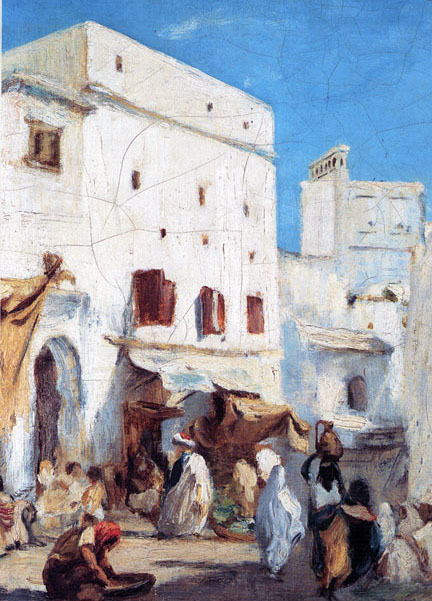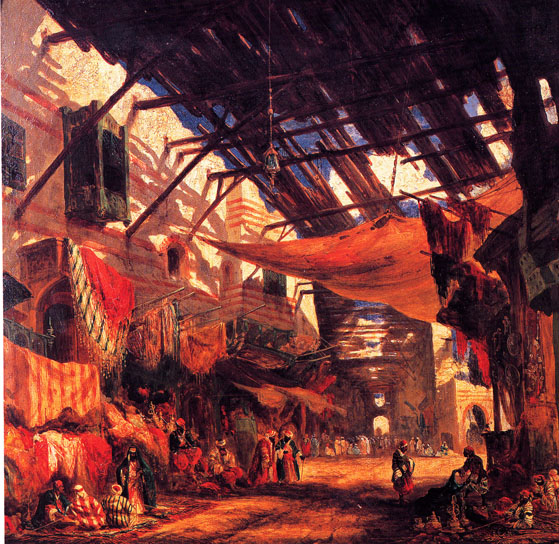 |
History 381
Islam and the West: Mutual Views
Rudi Matthee
Fall 2005
TTh 2:00-3:15 Smith Hall 203
223 Munroe Hall
Office Hrs: Tu Th: 1-2
matthee@udel.edu
Phone:
732-494-7598
|
For printable syllabus in Word Format.
Lecture schedule
An admixture of fear, suspicion and fascination has long marked mutual views
between the Western, mostly Christian, world and the world of Islam. This course
examines the expression of these views, and traces their evolution over time in
light of military aggression, commercial expansion, travel and discovery. We
will see how “our” current anxieties about Muslim terrorism and “their”
resentment of the West originated in medieval religious polemics, how they
perpetuate the imagery of otherness created during the Crusades and the Ottoman
conquest of southeastern Europe , and how in modern times they have been
influenced by colonialism and Zionism. But we will also see how until the onset
of modern times with its increasingly rigid ethnic and religious boundaries, the
differences we now think are crucial mattered much less to people in the
(Islamic) Middle East. We will learn how mutual fear and suspicion are
intertwined with the lure of the other, how Westerners at various times have
found themselves drawn to the “exotic” Orient as a form of escapism, while
Muslims have long been ambivalent about the West and its symbols, seduced by its
promise of modernity and (political) freedom, and repelled by the void created
by that same freedom
Required readings (at the UD bookstore):
Richard Fletcher, The Cross and the Crescent: Christianity and Islam from
Muhammad to the Reformation . New York : Viking, 2003.
Bernard Lewis, The Muslim Discovery of Europe . London : Weidenfeld
and Nicholson, 1982.
Alexander Lyon Macfie, Orientalism: A Reader . New York : New York
University Press, 2000.
Zachary Lockman, Contending Visions of he Middle East : The History and
Politics of Orientalism . Cambridge : Cambridge University Press,
2004.
Reserve Reading List :
Richard Eaton, “(Re)Imag(in)ing Other 2 ness: A Postmortem for the Postmodern
in India ,” Journal of World History 11 (2000): 57-77.
S. Amanda Eurich, “Secrets of the Seraglio: Harem Politics and the Rhetoric
of Imperialism in the Travels of Sir Jean Chardin,” in Glenn J. Ames and Ronald
S. Love, eds., Distant Lands and Diverse Cultures: The French Experience in
Asia , 1600-1700 . Westport : Praeger, 2003, pp. 47-70.
Thierry Hentsch, Imagining the Middle East . Trans. From the French.
Montreal : Black Rose Books, 1992.
Carole Hillenbrand, The Crusades: Islamic Perspectives . New York :
Routledge, 2000.
Samuel Huntington, “The Clash of Civilizations?” Foreign Affairs
(Summer 1993): 22-49.
Ivan Davidson Kalmar , “Benjamin Disraeli, Romantic Orientalist,”
Comparative Studies of Society and History (2005): 348-371.
Ivan Davidson Kalmar , “Jesus Did Not Wear a Turban: Orientalism, the Jews,
and Christian Art.” In Ivan Davidson Kalmar and Derek J. Penslar, eds.,
Orientalism and the Jews ( Brandeis University Press, 2005), pp. 3-31.
Lelyveldt, “All Suicide Bombers are not Alike.” New York Times Magazine
Oct.28, 2001): 49-53, 62, 78
Bernard Lewis, Muslims and Jews , Ch. 5 of Semites &
Anti-Semites ( New York and London: Norton, 1986), pp. 117-139.
John M. MacKenzie, “Orientalism in Art,” Ch. 3 of Orientalism: History,
Theory and the Arts (Manchester University Press, 1995), pp.
43-70.
Rudi Matthee, “Between Aloofness and Fascination: Safavid View of the West.”
Iranian Studies 31 (1998): 219-246.
Rudi Matthee, “Between Sympathy and Enmity: Nineteenth-Century Iranian Views
of the British and the Russians.” In Beate Eschment and Hans Harder, eds.,
Looking at the Coloniser: Cross-Cultural Perceptions in Central Asia and the
Caucasus, Bengal , and Related Areas . Würzburg: Ergon, 2004, pp. 311-338.
Nissim Rejwan, “Islam and Judaism: Cultural Relations and Interaction through
the Ages.” John Bunzl, Islam, Judaism and the Political role of Religions in
the Middle East . Gainesville : University Press of Florida , 2004, pp.
28-60.
Kathryn Tidrick, Heart Beguiling Araby: The English Romance with Arabia
( London: I.B. Tauris, 1981; 2nd edn. 1989.
Lucette Valensi, Venice and the Sublime Porte: The Birth of the
Despot . Trans. from the Italian. Ithaca and London : Cornell University
Press, 1993.
Andre Wheatcroft, “Learning to Hate,” Ch. 10 in Infidels: A History of
the Conflict Between Christendom and Islam ( New York : Random
House, 2004), pp. 222-240.
Exams and Papers :
There will be take-home midterm exams on Sept. 22 and Sept. 29, and a
two-hour in-class final exam as scheduled for this course, on Dec. 16,
1:00-3:00. The final is not cumulative, even though there is no harm in
retaining what you've learned in the first part of the course. A 12-15 page
paper, based on a historical topic of your choice, approved by Professor Rudi
Matthee, is due on Nov. 29. You should have a one-page summary of the proposed
topic, with bibliography, ready by Nov. 1 to present for approval.
All work must be done on time; no incompletes are given except in cases of
major disaster.
Attendance :
Two unexcused absences at the sections are allowed. After that, each
unexcused absence will lower your grade one step, i.e. a B+ become a B, and B-
becomes a C+ etc. Five or more unexcused absences will result in an F.
Grades in the course will be based on the following:
1. Midterm examination 20%
2. Final examination 30%
3. Term paper 40%
4. Class attendance and
participation 10%
Research tools : (all in the reference section of the library)
The Encyclopaedia of Islam . Excellent resource on all aspects of
Islam and Middle Eastern history.
Encyclopaedia Iranica . Only up to the letter h.
The Encyclopedia of Religion .

Lecture and Reading Schedule :
Week One and Two: (Aug. 30-Sept. 8)
Lecture topic: Introduction: Origins and Early Expansion of Islam
Readings : Fletcher, Cross and Crescent , pp. 1-29.
Week Three: (Sept. 13-15)
Lecture topic: The Medieval Interaction: Commerce and Crusades
Readings : Fletcher, Cross and Crescent , pp. 30-130
Lockman, Contending Visions , pp. 1-37
Week Four: (Sept. 20-22)
Lecture Topic: Lecture topic: Changing Perceptions: The Renaissance
Readings : Lockman, Contending Visions , pp. 38-70.
Hentsch, Imagining the Middle East , pp. 81-118 (Res.).
Valensi, Venice and the Sublime Porte , pp. 31-44; 89-96
(Res.).
Lewis, Muslim Discovery , pp. 1-57
Week Five: (Sept. 27-29)
Lecture Topic: Islam's View of Christianity and Judaism
Readings : Rejwan, “Islam and Judaism” (Res.).
Lewis, Muslim Discovery , pp. 59-133
Matthee: “Between Aloofness and Fascination” (Res.).
Lewis: “Muslims and Jews.”

Week Six and Seven: (Oct. 4-13)
Lecture Topic: Islam's Views of Christianity and Judaism, cont'd
Readings : Lewis, pp. 134-277
Matthee, “Between Sympathy and Enmity” (Res.).
Week Eight: (Oct. 18-20)
Lecture topic: Orientalism, 18 th -19 th c.
Readings : Eurich, “Secrets of the Seraglio” (Res.).
Macfie, Orientalism , pp. 1-34
Lockman, Contending Visions , pp. 71-98
Wheatcroft, “Learning to Hate”
Week Nine (Oct. 27)
Lecture topic: Orientalism cont'd
Readings : Macfie, Orientalism , pp. 47-85
MacKenzie, “Orientalism in Art.”
Kalmar, “Benjamin Disraeli.”
Kalmar, “Jesus Did Not Wear a Turban.”
Week Ten: (Nov. 1-3)
Lecture Topic: Orientalism, 20 th c.
Readings : Tidrick, Heart-Beguiling Araby , epilogue (Res.).
Macfie, Orientalism , pp. 89-119, 181-216
Lockman, Contending Visions , pp. 99-181
Week Eleven: (Nov. 8-10)
Lecture Topic: Orientalism, 20 th C., cont'd
Readings : Lockman, Contending Visions , pp. 182-272
Macfie, Orientalism , pp. 123-177
Huntington, “Clash of Civilizations?”
Week Twelve: (Nov. 15-22)
Lecture Topic: Orientalism, 20 th c., cont'd
Readings : Macfie, Orientalism , pp. 216-377
Eaton, “(Re)Imag(in)ing Other 2 ness.”
Week Thirteen and Fourteen: (Nov. 29-Dec. 6)
Lecture Topic: Current Muslim View of the West
Readings : Hoffmann “Why They Don't Like Us” (Res.).


